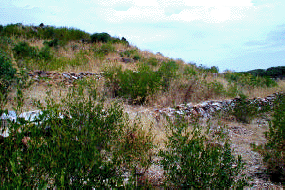Reforestation
Reforestation in the Watershed of Meskebete Dam; new terraces bordered by trenches support reforestation.
Image Credit: Brigitta Schütt and Stefan Thiemann 2001
In highly degraded areas reforestation is an important measure for regeneration of the soil and water balances (see figure). Trees fulfill many functions such as protection from erosion or conserving soil moisture. Two decisions have to be made initially when reforestation is to be done:
- should the area be completely closed for cultivation and pasture for a specific period? If so, the border must be marked clearly.
- which works better: direct seeding or planting of nursery-grown seedlings?
The answer depends on many factors such as climate, biotic factors, soil, etc. [10].
Nursery Practices
If a nursery is chosen the appropriate site has to be selected carefully. At least four criteria have to be fulfilled:
- the area of the intended nursery should be near the planting site;
- the area must be large enough (about 0.5 ha for every 100,000 seedlings) [10];
- availability of water year-round;
- the site should have a suitable soil.
The nursery can be managed commercially or by the community. Some know-how concerning soil-mixing ratios, irrigation, selection of species, etc. is required. In general, indigenous species are to be preferred, as experience with exotic species such as eucalyptus has shown in the past. When the seedlings reach an adequate size they are planted out. Later on, when the trees have grown, the forest can also be used by the people, e.g., for bee keeping.
By choosing appropriate soil and water conservation measures in WM projects it is to be considered that afforestation takes time to show positive impacts.
Agronomic measures are the third type of soil and water conservation measures explained in this Watershed Management-Module.



